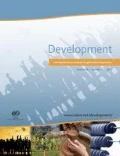Abstract
The issue of work–family balance has acquired rising prominence on the public policy agenda parallel to the feminization of the labour force in many countries around the world. Ipek Ilkkaracan draws upon case studies on seven OECD member countries in order to explore the variety of work–family balance environments and public policy debates that have emerged in these countries. She underlines the importance of an integrated approach to the development of both time-related work–family reconciliation policies such as care leave, its gender distribution and work hours, as well as provision and subsidization of care services. She also identifies strategies for moving the public policy agenda forward both in the North and the South pointing to the multitude of social and economic objectives that work–family balance policies serve.
Similar content being viewed by others
Notes
See Zacharias, Antonopoulos and Masterson (2012) for a discussion of the relationship between care deficits (or ‘time deficits’ to use their terminology) and poverty.
The research programme was led by Women for Women's Human Rights – New Ways, a feminist NGO based in Turkey, in partnership with Istanbul Technical University in 2008–2010. The discussion in this paper is based on the case studies developed under a common framework for this research programme and published in Ilkkaracan (2010), Sweden: Nyberg (2010), France: Silvera (2010), the Netherlands: Plantenga (2010), Spain: Beneria and Martinez-Iglesias (2010), South Korea: Peng (2010), Mexico: Matarazzo and Lopez-Ortega (2010), Turkey: Ilkkaracan (2010).
Silvera (2010) tracks the history of work–family reconciliation policies further back to late nineteenth century when the first public childcare centres were opened in France in 1881.
The 35 hours limit applies to workplaces with 20 or more employees; smaller firms abide by the 39-hour rule (Silvera, 2010).
This is in addition to maternity (16 weeks) and paternity leave (2 days).
Limited childcare pertains to children under three, while enrolment rates for the three–five age group is around 100 percent.
A high point of this conservative discourse was reached recently in 2012 as the Turkish Prime Minister called upon women to bear minimum three children each and called for an abortion ban. This was justified by the Minister for Family and Social Policies as a necessity if Turkey is to avoid the likelihood of the demographic crisis facing other countries. The Turkish strategy for avoiding the demographic crisis (making a moral call on women to bear more children and restricting access to abortion) stands in sharp contrast to the South Korean strategy where the State invests in child and elderly care. Obviously, the difference in female employment rates (half of adult women in South Korea versus only a quarter of women in Turkey) is a source of differences in country strategies.
References
Beneria, Lourdes (2007) ‘The Crisis of Care, Globalization of Reproduction, and ‘Reconciliation’ Policies’, 8th International GEM-IWG Conference Engendering Macroeconomics and International Economics, University of Utah.
Beneria, Lourdes and Maria Martinez-Iglesias (2010) ‘The New Gender Order and Reconciliation Policies: The example of Spain’, in Ipek Ilkkaracan (ed.) Towards Gender Equality in the Labor Market: Work–family life reconciliation policies (in Turkish) Istanbul: WWHR and ITU WSC-SET.
Beneria, Lourdes and Maria Martinez-Iglesias (2012) ‘Reconciliation Policies: The case of Spain from democratic transition to economic crisis’, Paper presented at the AWID Forum Istanbul, April.
European Commission (EC) (2006) ‘A Roadmap for Equality between Women and Men 2006–2010’, COM 92 http://europa.eu/legislation_summaries/employment_and_social_policy/equality_between_men_and_women/c10404_en.htm.
European Commission (EC) (2008) ‘Manual for Gender Mainstreaming: Employment, Social Inclusion and Social Protection Policies’, Luxemburg: Office for Publications of the European Communities.
Eurostat (2011) ‘European Commission Labor Statistics’, http://epp.eurostat.ec.europa.eu/statistics_explained/index.php/Employment_statistics, accessed 22 May 2012.
Ilkkaracan, Ipek (2010) ‘Gender Inequalities in the Labor Market in Turkey in the Absence of Work–family Reconciliation Measures’, in Ipek Ilkkaracan (ed.) Towards Gender Equality in the Labor Market: Work–family life reconciliation policies (in Turkish) Istanbul: WWHR and ITU WSC-SET.
Ilkkaracan, Ipek (2012) ‘Why So Few Women in the Labor Market in Turkey?’ Feminist Economics 18 (1): 1–37.
Matarazzo, Maria Cecilia and Mariana Lopez-Ortega (2010) ‘Reconciling Work and Family Life in Mexico as a Strategy against Poverty’, in Ipek Ilkkaracan (ed.) Towards Gender Equality in the Labor Market: Work–family life reconciliation policies (in Turkish) Istanbul: WWHR and ITU WSC-SET.
Nyberg, Anita (2010) ‘Public Childcare and Parental Leave in Sweden: From women's rights to children's rights, from a woman's problem to a men's problem’, in Ipek Ilkkaracan (ed.) Towards Gender Equality in the Labor Market: Work–family life reconciliation policies (in Turkish) Istanbul: WWHR and ITU WSC-SET.
OECD (2002) Babies and Bosses: Reconciling work and family life, Vol. 1, Australia, Denmark and the Netherlands, Paris: OECD.
Peng, Ito (2010) ‘Reconciliation Policies as a Means for Growth and Employment beyond Gender Equality: The example of Korea’, in Ipek Ilkkaracan (ed.) Towards Gender Equality in the Labor Market: Work–family life reconciliation policies (in Turkish) Istanbul: WWHR and ITU WSC-SET.
Plantenga, Janneke (2010) ‘Part-Time Employment as a Reconciliation Strategy in the Netherlands: Costs, benefits and future perspectives’, in Ipek Ilkkaracan (ed.) Towards Gender Equality in the Labor Market: Work–family life reconciliation policies (in Turkish) Istanbul: WWHR and ITU WSC-SET.
Razavi, Shahra (2011) ‘Rethinking Care in a Development Context: An introduction’, Development and Change 42 (4): 873–903.
Silvera, Rachel (2010) ‘Parentalism as a New Approach to Gender Equality in France’, in Ipek Ilkkaracan (ed.) Towards Gender Equality in the Labor Market: Work–family life reconciliation policies (in Turkish) Istanbul: WWHR and ITU WSC-SET.
Zacharias, Ajit, Rania Antonopoulos and Thomas Masterson (2012) ‘Why Time Deficits Matter: Implications for poverty measurement and poverty reduction strategies’, Working Paper, Annandale-on-Hudson, NY: Levy Economics Institute of Bard College.
Additional information
Gives the findings of a multicultural case study on women's care work in family and communities
Rights and permissions
About this article
Cite this article
Ilkkaracan Ajas, I. Work–Family Balance and Public Policy: A cross-country perspective. Development 55, 325–332 (2012). https://doi.org/10.1057/dev.2012.52
Published:
Issue Date:
DOI: https://doi.org/10.1057/dev.2012.52




